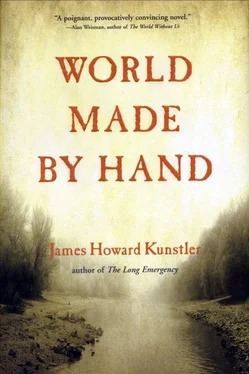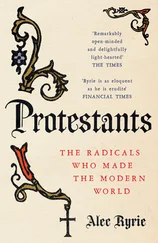The service road up to the dam was overgrown after years of neglect, and a crew had evidently worked hard to clear it the past week. The pungent smell of freshly cut trees and raw disturbed earth made for an exciting aroma of enterprise. The scale of the operation was impressive when you consider it was all done without machines or power tools. We hadn’t mounted a collective effort like this in town for years. Some New Faith men were working at a sawbuck there, cutting the felled trees into eight-foot lengths to send back down below for stove wood.
I found Brother Jobe and a large gang of men further up in the vicinity of the dam. The work crew included twenty New Faith brothers, among them my recent companions Joseph, Elam, and Seth, and five of our own town men: Tom Allison, Doug Sweetland, Rod Sauer, the mason, Jim VanMeter who used to run an excavation service, and Brad Kimmel, a talented fellow whose fix-it shop was vital in a society that was forced to recycle virtually everything. It was the first time I’d seen Brother Jobe without his frock coat and some kind of necktie. He was dressed in muddy linens with his sleeves rolled up, and was right in there working with the rest of the men. I stood back and watched them lay a six-foot length of ten-inch-diameter concrete pipe in a trench, about a hundred yards from the dam. They had rigged up a portable crane out of timbers and a chain winch, with a box at the leverage end for fieldstone counterweights, and this allowed them to jockey the heavy pipe into place. When the new concrete section was positioned to their satisfaction, they yanked up a length of rotted iron pipe from the trench.
At the conclusion of this operation, Brother Jobe called a break. News had obviously gotten around about our successful return from Albany with Bullock’s boat crew, and the town men gathered round to greet me and ask me about what was now being called the Big Breakout. It frightened me to think back on it, about the horror and confusion of the moment, and the man with the red whiskers who pointed his gun at me, and what I did. But I was grateful that their spirits were high. Both the Union Grove men and the New Faith men seemed energized by the new experience of working shoulder to shoulder at a task that would make life in our town better for a change.
They had set up a camp kitchen under an open-walled tent nearby, and several New Faith women were in there along with townspeople Marsha Kimmel and Joanne Pettie turning out a midmorning snack for the crew: big buckwheat-and-potato-flour flatcakes rolled up with butter and jam, and rose-hip tea to wash it down. Brother Jobe steered me over to the face of the dam while the others got their food. It was about fifteen feet high. A trench ran up to it and I could see a new copper fitting that had been run up into the original supply pipe at the base of the dam below the frost line.
“I hear you had quite an adventure in Albany,” Brother Jobe said.
“We accomplished what we set out to.”
“Yes, it come out pretty well,” Brother Jobe said and cleared his throat. “I know that some people got hurt down there. From what Joseph told me, they asked for it. This is exactly the kind of lawless monkeyshines we saw everywhere coming up from Virginia. Gangsterism. Hostages and ransoms and whatnot. But I’m sorry you had to discharge a firearm at somebody.”
“He was aiming to kill me.”
“Quite a feeling, ain’t it? Getting shot at.”
“I would have been happy to pass on it.”
“Yeah, well, this is the kind of country we live in now, old son. Your own people who speak English and wear the same kind of clothes as you do aiming to blow your brains out for sheer greed and sinfulness. That’s why we have to build something lawful here, if we can. You see what I mean now?”
“I see where we’ve been pretty lucky here for the most part in recent years.”
“You’re goldurn straight,” he said and spit into the trench. Then his face lit up all smiling. “Speaking of which, your dam’s straight now too. Ain’t that something? We’ll be done with her before the end of the day if our Mr. Bullock manages to get one more length of new pipe up here.”
“That’s very good news indeed.”
“You wouldn’t believe what we dragged out of the intake,” he said and jerked his chin up the face of the dam. “A dead coyote. Turtle shell the size of a dadblamed wheelbarrow, among other trash. Don’t you all know that you got to pay attention to a system like this?”
“Things just slipped. Especially under Dale.”
“You all been drinking dead coyote juice for months. You’re lucky it didn’t start no outbreak. You better appoint a water commissioner or some such of a responsible party first thing, and get some volunteers to come up here reg’lar and clean the trash out—”
Just then, we saw a wagon lumbering up the hill, creaking loudly under its load. It was a flatbed behind a team of ghostlike gray Percherons.
“Looks like we’re in business now,” Brother Jobe said.
The final length of cast concrete pipe lay tied down and padded up in the flatbed. We went down there. It was driven by Bullock’s man Jack Hellinger. Jack leaped down from the driver’s bench and came straight over to me while others held onto the harnesses and worked the crane around to unload the new pipe.
“Mr. Bullock sends his greetings and regards,” Jack said, “and says that he wants to put on a grand levee tonight in honor of you and these brotherhood fellows who went and got back Tom and the boys in Albany. And if it isn’t asking too much, he says, would you mind getting up your bunch to furnish the music? What do you say, Robert?”
“Why, tell him I’m honored as to the first part, and I’ll be glad to arrange the second.”
“That will please Mr. Bullock, I’m sure. Festivities to begin in the early evening. He says he’ll send every wagon, carriage, and cart over to town to help fetch those that need it.”
“We’ve got wagons too,” Brother Jobe said. “Don’t forget.”
“We’re going to roast a whole steer and more than a few hogs,” Jack said. “The women are baking up a storm. And the liquor will flow.”
“Hot diggity,” Brother Jobe said. “You need any pointers in the barbeque department, we’ll be glad to lend a hand.”
The last length of cast concrete water conduit was laid down around two that afternoon. It was obvious we’d eventually have to replace more of the main trunk below, but for now the system was restored. We got the trench filled in and the worksite all squared away by late afternoon. Our boys put the word out around town about the levee at Bullock’s as they filtered home. Tom Allison sent his boy off on horseback to alert the farmers outside of town, and many of the successful ones like Deaver, Weibel, and Zucker, who employed townspeople, let their hands off work early. Brother Jobe sent a wagon around with two “sisters,” Helen and Emily, offering to take anyone’s little children to an evening of babysitting over at the old high school with the New Faith youngsters. Even the weather seemed to cooperate as a cooling northerly breeze cleared out the persistent haze and dropped the humidity.
I went around myself to alert the music circle members about the engagement at Bullock’s request that night-Eric Laudermilk, our guitar player, Dan Mullinex, flute and clarinet, Leslie Einhorn, cello, Charles Pettie, our bass player, Bruce Wheedon, second violin, and Andy Pendergast, who was delighted to hear we were called to play. I distributed the rest of those new wound steel strings I’d picked up in Albany. As far as I recalled, Bullock had a piano on the premises somewhere, but Andy wanted to bring his harmonium out just in case. On my way home, going down Van Buren Street, I ran into Loren pulling a handcart heaped with manure from Allison’s stable, I suppose for composting in the rectory garden. Loren’s face was bright red with exertion, and half moons of sweat darkened the underarms of his frayed blue shirt from pulling the load uphill. We both paused by the cemetery fence in the shade of a horse chestnut. “Remember Gatorade?” Loren said.
Читать дальше












